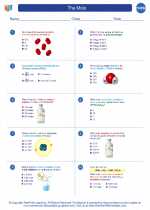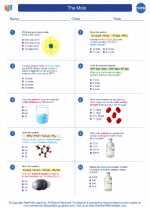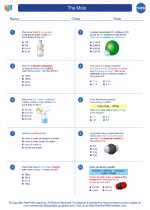Effects in Chemistry
In chemistry, the term "effect" refers to the influence or consequence of a particular action or condition on a substance or a chemical reaction. There are various effects that are studied in chemistry, and understanding them is important for comprehending the behavior of substances in different conditions.
Common Effects Studied in Chemistry:
- Temperature Effect: The impact of temperature on chemical reactions. With an increase in temperature, the rate of many reactions increases due to higher kinetic energy of molecules.
- Concentration Effect: How the concentration of reactants in a solution affects the rate of a chemical reaction. Generally, an increase in concentration leads to a higher reaction rate.
- Catalytic Effect: The influence of catalysts on the rate of chemical reactions. Catalysts can speed up reactions by providing an alternative reaction pathway with lower activation energy.
- Surface Area Effect: The effect of the exposed surface area of a solid on the rate of a reaction occurring on the surface. Finely divided solids generally react more rapidly than the same substance in larger pieces.
- Solvent Effect: How the choice of solvent affects the solubility and reaction rate of solutes. Different solvents can have different effects on the chemical properties of substances dissolved in them.
- Pressure Effect: The impact of pressure on the behavior of gases. For reactions involving gases, changes in pressure can influence the equilibrium position and reaction rates.
Study Guide:
To understand the effects in chemistry, it's important to grasp the underlying principles and factors that contribute to each effect. Here are some study tips:
- Review the kinetic molecular theory and its application to the temperature effect.
- Understand the collision theory and how it relates to the concentration effect.
- Explore the role of catalysts in lowering activation energy and facilitating reactions.
- Examine the concept of surface area and its impact on reaction rates, particularly for heterogeneous reactions.
- Learn about solvent-solute interactions and how they influence chemical processes.
- Study the behavior of gases and the relationship between pressure, volume, and the equilibrium state.
By mastering these concepts and their associated effects, you'll be better equipped to analyze and predict the outcomes of chemical reactions under different conditions.
[Effect] Related Worksheets and Study Guides:
.◂Chemistry Worksheets and Study Guides High School. The Mole
The resources above cover the following skills:
Chemistry II
Reactions
Use mathematical representations to analyze the proportion and quantity of particles in solution.
Equilibrium
Analyze and interpret data to explain the change in concentration of products and reactants, and the stable state achieved under reversible conditions.



